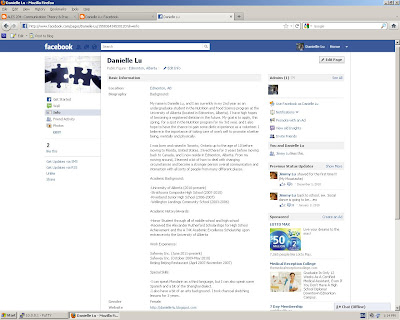ALES204 was a class unlike any other that I've taken university. It relied on our own abilities to be critically literate and efficiently analyze, which opened this class up to our own interpretations. Instead of making us memorize certain facts, ALES204 taught us the skills to understand a good article from a bad one, for example, or how to effectively communicate our ideas in a professional manner. ALES204 was much more interactive compared to other classes, and since there were no major exams for this course, the responsibility of taking up the information learned in class was purely dependent on the involvement of the students. The use of Twitter also played a big role in keeping us alert and thinking during class! By keeping me engaged, I did not miss important information that I might otherwise have dazed off from, so I always learned something new!
A major topic the class revolved around was social media. The many different presentations given to us showed how much social media is expanding globally, which allowed us to realize the importance of its function in the workplace, advertising, etc for ourselves firsthand. In labs and through assignments, our tasks included approaches to different communication tools for uses that would essentially help us in our future careers. I liked the set-up in which we were first given the information, and then afterwards, we were left to find how useful this information was by letting us apply it to ourselves, an example being promoting our achievements through a CV. When we practice the skills we learn, it helps to shape our perspectives about whether this would or would not be useful to ourselves. The class is not forcing us to do anything. We do not have to use a LinkedIn profile or a Facebook page of ourselves or a Twitter account, if we choose not to; ALES204 only gives us the option and teaches us different ways to make us stand out from other people. By giving us a wide scope of communication tools, the class creates opportunities for students to find what would benefit and appeal to them most.
ALES204 took many of the common websites we use on a daily basis and showed how we could use them in a different way. Learning about utilizing Facebook in professional sense was an eye-opener for me. I had always used Facebook for personal reasons and had never thought about how it could help me promote my ambitions, achievements and skills online to future employers (you can check it out at http://www.facebook.com/pages/Christine-Wang/155836434530120)! I realized that just because people use Facebook, or any social media tool, a certain way, that is not the only way. What other people choose to do with these tools does not define its function. We do. Although social media has come a long way from the early 1990s, it is the people who are innovating it more than anything else. Twitter is similar to Facebook in this respect. Twitter, like Facebook, is known for its use in creating a network where friends and families could connect with one another, but the both of them have evolved. A Facebook page can be used as an "online resume," as mentioned earlier, and Twitter can be used to promote awareness about certain issues, such as politics, charities and news topics!
At a first glance, I thought the name "Agricultural, Life and Environmental Sciences" was an actual science course, where we would learn about certain topics that would apply to all Faculty of ALES students' programs of choice, so when I received the syllabus on the first day of class, I was confused and honestly disappointed. Skimming through, I didn't see how blogging and Facebook would prove any use to me as a university student. After the first few classes, I still was not warming up to the layout of the class as well as our expectations (using Twitter every class, for example), since it was unfamiliar to what I was used to. However, after spending the whole semester, attending classes and labs, I have come to appreciate the topics covered in class that help us present ourselves to future employers, clients, etc. I see now that I had judged this class too early, and I am grateful that the Faculty of ALES students have this as a required course. With that in mind, we should make the best use of everything we learned in class since out of the all the university students, we are the few who have the option of taking an innovative class such as this one.
Check out Lindsey's blog post here! Lindsay talks about the importance of using different forms of communication through learning how to achieve the most reliable information. Like Lindsay, I am also in Nutrition and Food Sciences, so I completely agree that educating one's self about finding trustworthy information. Many companies try to twist the truth in their favour, basing their success on debatable technicalities for a quick buck, so people, as consumers, need to fully understand what they're being persuaded to do, eat or buy for the sake of their health as well as others. "Don't believe everything you read!" Find out for yourself! There is an underlying value of being able to say, without a doubt, that you know "so and so" is true by spending time researching!
These are the posts I have commented which all have excellent insight I believe to be worthwhile reads!
- Hannah O'Reilly's "Introduction: About Me and My Studies"
- Brenda Le's "Confessions of a Twitter Skeptic"
- Stephanie Nash's "Kony 2012: Make Him Famous"
- Carol Amaral's "Writing a Wikipedia Article"
- Alana Soderberg's "Final Reflection"
Thank you for a great semester, and thank you to all who took the time to read my blog!
Catch you guys later!

The next step [Digital Image]. (2012). Retrieved April 12th, 2012, from: http://gratitudeplanet.com/2011/01/28/there-is-always-the-next-step/






